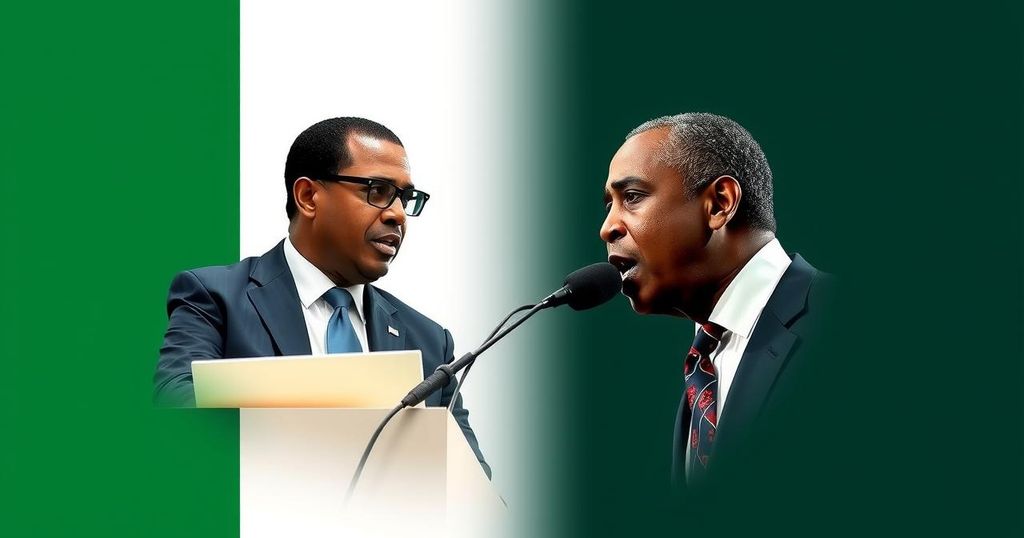World news
AFRICA, ALL PROGRESSIVES CONGRESS, ALL PROGRESSIVES CONGRESS PARTY, BOLA TINUBU, BUHARI, CORRUPTION, DEMOCRACY, GOOD, GOODLUCK JONATHAN, GOVERNANCE, JONATHAN, LABOR PARTY, LAGOS, MUHAMMADU BUHARI, NIGERIA, NORTH AMERICA, OBI, OPPOSITION, PETER OBI, POLITICS, UNITED STATES
Oliver Grayson
0 Comments
Reflections on Political Disillusionment: Cross-National Perspectives on Elections
The article explores the aftermath of the U.S. presidential election through the lens of a Nigerian journalist who reflects on personal experiences with political disillusionment and loss in electoral outcomes. Drawing parallels between the political climates of Nigeria and the U.S., it emphasizes the need for acceptance, humility, and unity to transcend divisions and promote healing within society following contested elections. The author calls for leadership that embodies integrity and community focus as essential components for future political stability.
The conclusion of the U.S. presidential election has raised significant discussions, especially among those whose preferred candidates were not successful. Adapting to this reality can be particularly challenging for individuals who have personally encountered similar experiences within their own nations. For instance, the author draws parallels with Nigeria’s previous elections, specifically referencing the 2015 contest between Muhammadu Buhari and Goodluck Jonathan, where their choice, Jonathan, ultimately lost despite his perceived merits. This personal connection provides a framework for understanding the weight of political disillusionment.
In Nigeria, the 2023 election presented yet another choice for change, with many rallying behind Peter Obi of the Labor Party against Bola Tinubu of the All Progressives Congress. Obi represented hope for many Nigerians disenchanted with the corruption and failures of the past eight years under Buhari. The author, passionate about this cause, contributed financially to Obi’s campaign, despite having never participated in elections before, reflecting a deep-rooted desire for transformative leadership.
However, disillusionment struck once more as Obi lost the election, placing third in the final results. Following the court ruling that dismissed Obi’s challenge to the election’s legitimacy, observers noted the perception of injustice, similar to sentiments in the U.S. regarding Donald Trump’s electoral victories despite ongoing legal troubles. Emmanuel Ogebe, a legal analyst, expressed a bleak outlook on the state of democracy in both nations, suggesting a collective moral decay.
The author elucidates the troubling dynamics in both Nigeria and the U.S., highlighting how recent political events perpetuate division and hatred among citizens. Ogebe’s lament for American youth reflects a common worry; that values of integrity and accountability are under siege in favor of populist figures. The author mirrors this distress while articulating the challenges faced by those trying to heal the wounds inflicted by divisive politics in both contexts.
A fundamental aspect of moving forward lies in acceptance and reconciliation. For progress to occur, individuals must rise above mere partisanship and cultivate humility. The potential for healing is contingent upon the willingness of all parties involved to engage empathetically and constructively rather than perpetuating cycles of animosity.
Ultimately, the author emphasizes the necessity for unity and the importance of leadership that embodies integrity, advocating for an approach that prioritizes communal well-being over the allure of power. As political landscapes continue evolving, the hope remains that both Nigeria and the United States can forge paths that uphold the values of democracy and social justice while advocating for a future characterized by peace and collaboration.
This article examines the sentiments surrounding the outcome of the recent U.S. presidential election, drawing parallels with the author’s experiences in Nigeria’s electoral system. It reflects on political disillusionment and the challenges faced by citizens when their preferred candidates do not win. The narrative incorporates insights into Nigeria’s political landscape, particularly the 2023 elections, and discusses the broader implications of leadership and division in democratic societies, showcasing how similar tensions manifest across national contexts.
In conclusion, the post-election landscape reveals significant challenges that both Nigeria and the United States must confront to ensure the preservation of democratic values and societal cohesion. The experiences of disillusionment described by the author underscore the need for greater empathy and unity among citizens. Furthermore, it highlights the importance of leadership that prioritizes collective well-being over divisive agendas. Moving forward, embracing constructive dialogue and humility may facilitate healing and progress in both nations, fostering a more inclusive environment for all.
Original Source: baptistnews.com




Post Comment